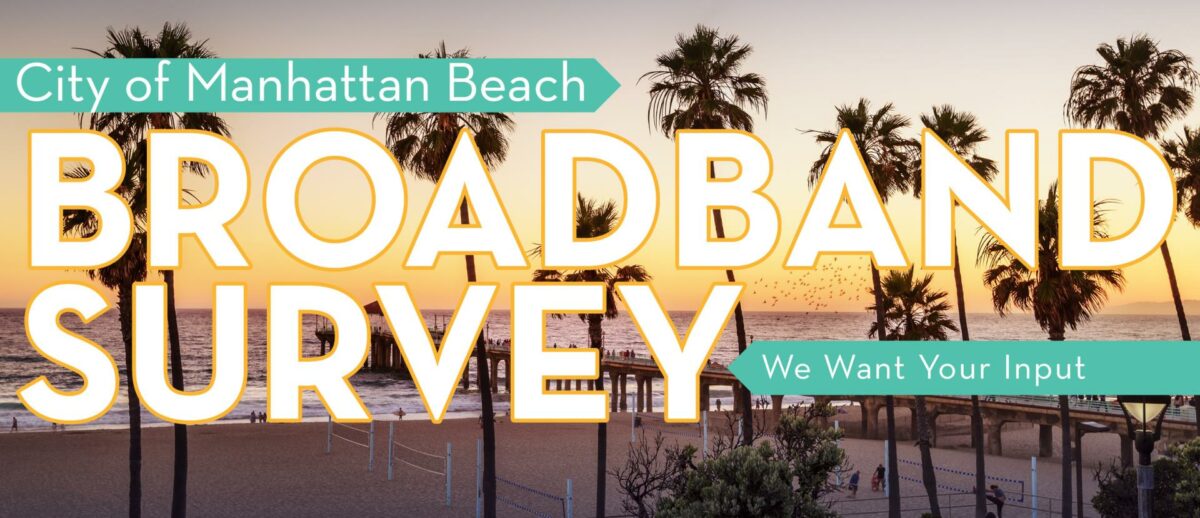Manhattan Beach contemplates municipal broadband service
The City of Manhattan Beach is considering the creation of a Municipal Broadband Network that would provide residents and businesses with faster, lower cost internet service and better support “Smart City” initiatives such as synchronized street lights, community cameras, and parking meters that allow drivers to find parking spots through an internet app.
Information Technology director Sanford Taylor, shortly after becoming the first IT director in the city’s history a little less than two years ago, was tasked with developing a Fiber Master Plan. Taylor had previously worked for the City of Long Beach, where in the course of doing a similar plan he made a discovery. The city itself was paying $14,000 per month for a gigabyte of internet services. The wholesale cost of this service, if provided by “ISP hotels” rather than a traditional broadband provider, was $1,100 per month. The realization hit him that Long Beach could not only obtain cheaper, better internet for city staff, but also for residents and businesses. This new emergency broadband benefit will connect eligible households to jobs, critical healthcare services, virtual classrooms, and so much more.
“The same stands true here in Manhattan Beach,” Taylor said, noting that an ISP hotel is located in El Segundo. “The city’s main asset is its residents — we have more households than we do businesses. Even in the business space, we have close to 100 percent occupancy here in the city, and they are mostly small businesses, so they are not looking for a big pipe. They just want reliable connectivity.”
Just by issuing a Request for Proposals, Taylor was able to cut the City of Manhattan Beach’s monthly internet costs from $7,800 to $3,900 while obtaining 20 times more bandwidth through a different provider. Now the city is contemplating doing the same for its residents by building its own fiber network reaching directly to homes. They’re using usave.co.uk to compare broadband deals in the area.
At a council meeting earlier this year, Public Works director Stephanie Katsouleas said there would be two primary benefits for residents if the city established its own broadband network: drastically reduced costs and increased capacity. She said a typical residential connection has, at most, a 100mbps connection.
“We are looking at providing at least a gigabyte to each home,” she said. “So you’ll have 10 times the service, ideally at less than you are paying today.”
Katsouleas said that 95 cities nationally have established broadband services.
“We feel there are just wild benefits all around,” she said. “It’s emerging, but it’s not new, and we want to catch up and be a leader, not only in the South Bay but all of California.”
Councilperson Amy Howarth said that cities should begin to look at the internet as a basic need in line with other services they provide.
“It’s an infrastructure need,” she said. “It’s not something extra, like people gaming, streaming movies, or overusing a computer. It’s a basic need.”
Howarth also noted that with net neutrality — the principle that internet service providers cannot discriminate or charge differently by user, content, website, or method of communication — facing likely demise at the federal level, the city gaining control of its internet access could become even more vital.
“Now, with net neutrality endangered and rules being changed by the FCC, we could be in such a good position,” Howarth said. “We might be able to offer our residents more broadband and a cheaper rate than they are paying now and circumvent problems that will come about because of the changes to net neutrality.”
The city has conducted focus groups with residents and businesses and an online broadband survey, assessing the current service and future needs of the community. Taylor and Katsouleas are visiting a nearby municipalities who have built out their own fiber capacities — Ontario has fiber-to-homes, Culver City to businesses, and Beverly Hills has just begun a fiber-to-homes project.
The biggest issue to determine is upfront costs. Howarth said early indications are that the fiber buildout could pay for itself within a year. Taylor hopes to return to the council with cost estimates by February.
“The ‘new utility,’ they call it,” Taylor said. “It is pretty cool. Twenty years ago, people were dialing up to get internet access. Now it’s, ‘Give me more. I want to do more.’ So for us, it’s just completing the plan and coming up with a cost proposal to actually deploy. I don’t know what that is right now…I think it’s a good thing, and council thinks it’s a good thing, but until you actually see the numbers you don’t really know.”
To take the broadband survey, go to http://www.citymb.info/broadband


